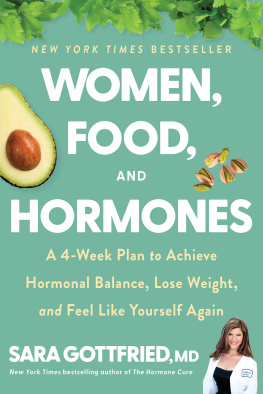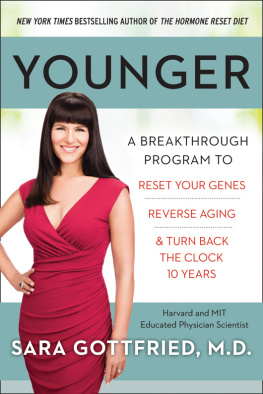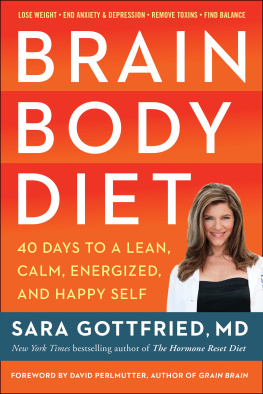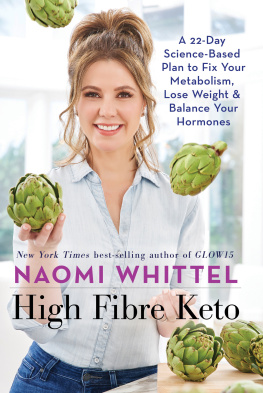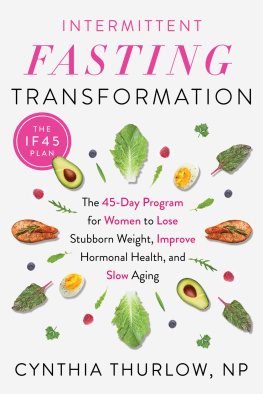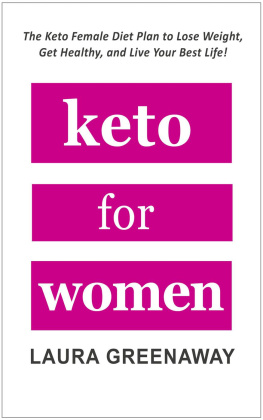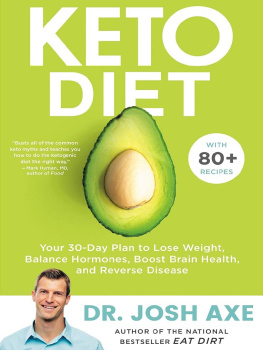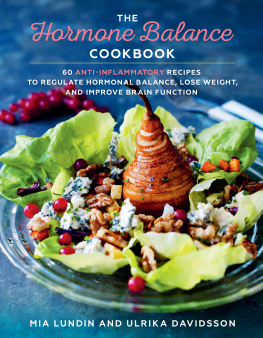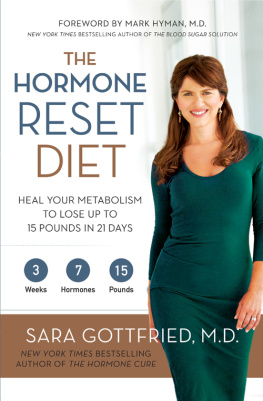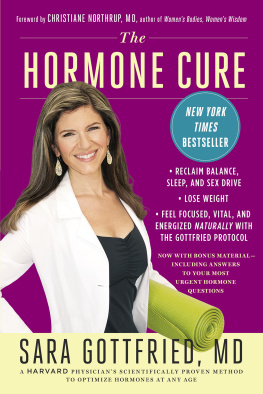Copyright 2021 by Sara Gottfried, MD
Illustrations by Sara Gottfried, MD, and Kevin Plottner
All rights reserved
For information about permission to reproduce selections from this book, write to or to Permissions, Houghton Mifflin Harcourt Publishing Company, 3 Park Avenue, 19th Floor, New York, New York 10016.
hmhbooks.com
Library of Congress Cataloging-in-Publication Data
Names: Gottfried, Sara, author.
Title: Women, food, and hormones : a 4-week plan to achieve hormonal balance, lose weight, and feel like yourself again / Sara Gottfried, MD.
Description: Boston : Houghton Mifflin Harcourt, 2021. | Includes bibliographical references and index.
Identifiers: LCCN 2021004079 (print) | LCCN 2021004080 (ebook) | ISBN 9780358345411 (hardcover) | ISBN 9780358578437 | ISBN 9780358578840 | ISBN 9780358346210 (ebook)
Subjects: LCSH: Reducing diets. | Ketogenic diet. | Low-carbohydrate diet. | MenopausePopular works. | Middle-aged womenHealth and HygienePopular works.
Classification: LCC RM222.2 .G6817 2021 (print) | LCC RM222.2 (ebook) | DDC 613.2/5dc23
LC record available at https://lccn.loc.gov/2021004079
LC ebook record available at https://lccn.loc.gov/2021004080
v2.0921
Cover design by Kerry Rubenstein and Mark Robinson
Cover photographs Getty Images
Author photograph Abigail Huller Photography
This book presents, among other things, the research and ideas of its author. It is not intended to be a substitute for consultation with a professional health-care practitioner. Consult with your health-care practitioner before starting any diet or other medical regimen. The publisher and the author disclaim responsibility for any adverse effects resulting directly or indirectly from information contained in this book.
Some names and identifying details have been changed.
Pudding recipes adapted from Younger by Sara Gottfried, MD.
Part I
Understanding Women, Food, and Hormones
INTRODUCTION:
The Language of Hormones
Few things on earth are as misunderstood as women, food, and hormones.
Ive seen it again and again in my practice: women come to me feeling overtired, cranky, frazzled, andinevitablylamenting the extra pounds theyve put on despite their best efforts to exercise and eat right. More often than not, these issues start when women enter their midthirties. My patients notice that its harder to maintain a healthy weight. Those holiday pounds are harder to shave off, even with Januarys discipline. The diet plans that worked in the past dont seem to work anymore. Even more disheartening, diets that work for male co-workers and partners dont seem to work the same for them.
My patients are often surprised when I explain that the solution to their symptoms cant be found by counting calories or clocking miles on the treadmill, but by learning to speak the language of hormones.
I know what youre thinking: hormones? Yes, hormones.
As a board-certified physician who has been practicing medicine for more than twenty-five years, and precision medicine for the past fifteen, I can tell you without a doubt that you cannot achieve true health without achieving hormonal health and balance. I can help you do just that, using science that honors your body.
What does that mean, exactly? When your diet and lifestyle support your hormones, your hormones will support you. Its like a cool breeze on a hot summer day when your food tells your body to burn fat and promote health. You flip a metabolic switch, and your body is transformed. This is particularly welcome after age thirty-five, when the scale gets harder to budge!
What makes the scale stick? Your metabolism is grinding to a halt. Your metabolism is the sum of all of the biochemical reactions in your body, including those related to your hormones, that dictate how you feel and determine how fast or slow you burn calories. Metabolism is the foundation of your health, today and tomorrow. When you learn to speak the language of hormones, you can improve metabolism, lose fat, and finally maintain a healthy body weight by burning rather than storing fat. At the same time, you resolve nagging, unpleasant symptoms like fatigue, cravings, moodiness, insomnia, and a weak immune system. Too many health plans dont work because they are designed by men, for men, and not for womens complex hormonal needs. Im going to show you how to achieve this ultimate goal in a way that honors your unique female biology.
WHAT TO EAT?
Many of my patients want to know what to eat to stay healthy, but they feel confused. I dont blame them: theres so much conflicting information out there. And over time, the answer has changed. In the 1980s, fat was villainized; later, sugar. As fasting protocols became all the rage, the focus shifted from what should I eat to when should I eat. Very often my patients come to me having tried these various plans, only to find they just gained weight, or they are so overwhelmed with choices, they stay in the same food rut because they arent sure which plan is right for them.
What not to eat is easy. The truth is, a powerful link exists between consumption of processed food, weight gain, and poor immunity. More than half of Americans caloric intake now comes from ultraprocessed foods: chips, soda, cookies, candy, and other Frankenfoods. The results are plain to see. Not only did the United States fare worse than many other countries during the COVID-19 pandemic, but also our rates of weight gain, obesity, diabetes, cardiovascular disease, cancer, and depression are high. The food we eat sets us up to be extraordinarily unhealthy, making us vulnerable to chronic disease and to viruses like COVID-19.
My answer to this age-old question of what to eat? Eat for your hormones.
Food is the backbone of the hormones you make. When it comes to your health and metabolism, food is medicine. Im going to clear up the confusion about whats healthy and whats not and give you all the support you need to be successful. Ill share a proven plan thats designed to meet your hormonal needs and help you reclaim your health in four weeks.
To start, consuming healthy fat is especially critical to long-term hormone balance. Healthy fat makes you feel more satisfied, and it slows down or eliminates the spikes in blood sugar that can make you accumulate fat. You need moderate proteinnot so much that it turns into sugar, but not so little that your muscles start to break down. Some guidelines youve likely heard about before are important too, such as avoiding sugar and excess refined carbohydrates, enjoying healthy fats like extra-virgin olive oil and avocado oil, and even following fasting protocols. Ive integrated these strategies into a single cohesive approach I call the Gottfried Protocol, which will allow you to switch your metabolism from stuck and inflexible to unstuck and flexible. As you do so, youll lengthen your health span (that is, your healthy life span), support your immune system, and improve your overall health.
HOW NUTRITION AND I EVOLVED TOGETHER
I didnt learn the answers to these food queries at Harvard Medical School or the University of California at San Francisco, where I served my internship and residency in obstetrics and gynecology. In fact, during my medical education, nutrition and lifestyle approaches to health were tolerated but never championed. Yet this lack of interest was a scientific contradiction that has since been evolving. We now know that better diet and lifestyle are the most important drivers of disease prevention and reversal for the people who are willing to commit to them. Science has documented the evidence for this fact many times over, though the discoveries have been largely ignored by mainstream medicine.

